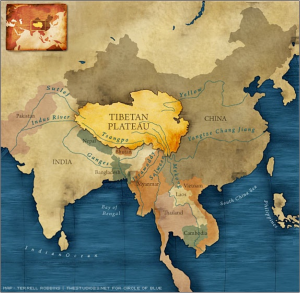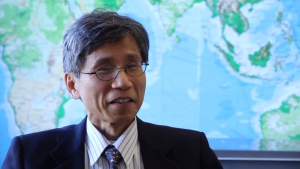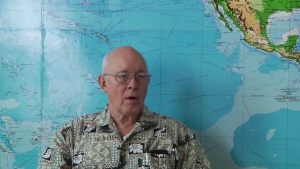China’s Plans to Divert Water on the Tibetan Plateau
Memo #110 – The prospect of China controlling the taps of Asia’s main rivers is a subject of intense debate. Downstream countries are understandably concerned. But Chinese experts say it is the Chinese who should be most worried about its government’s plans.
Is Northern British Columbia De-Globalizing?
Memo #91 – Using the most common measure of economic openness – the ratio between exports and GDP – British Columbia’s (BC) economy has become less open in the past decade. In 2000, the provincial export to GDP ratio was over 25 per cent; by 2009 it had fallen to under 20 per cent. Is the province actually ‘de-globalizing?
AMRO – Fleshing out Regional Monetary Cooperation in East Asia
Memo #90 – On May 4, 2011, representatives of the ASEAN +3 group took another critical step forward in realizing the goal of a full-fledged regional financial entity. These developments have special importance given the leadership vacuum at the International Monetary Fund (IMF) and the intransigence of the European Union and the United States in further democratizing the process for leadership selection at the IMF.
Key Issues Facing East Asia – (Video Interview with Dr. Tun-jen Cheng)
Memo #67 – In this interview, Dr. Tun-jen Cheng discusses a range of key issues facing East Asia today, including religion, governance, economics, and politics. When speaking about a religious revival in China, Dr. Cheng notes that Christianity is accepted by many new middle class urbanites as a source of inspiration and a symbol of modernity and greatness. Dr. Cheng then gives an account of the challenges facing East Asian democracies. Most notably, he mentions the public’s complaints about the shortage of horizontal accountability – the checks and balances between various branches and units of government. Nonetheless, he concludes that East Asian democracies are quite robust when compared to systems in Southeast Asia and the Middle East.
East Asia’s Population Crisis: Solutions
Memo #61 – Japan reported missing 230,000 centenarians in September 2010. This dramatic news highlighted among other things, the rapid aging of Japan’s population and its low total fertility rates. For the past decade, demographers have called attention to the impending population crisis in East Asia. Several countries saw fertility rates plummet to well below 2.1 births per woman – the rate required to sustain a population, assuming all other factors remain relatively constant. The problem has been compounded by increased life expectancy and the lack of immigration flows to compensate for birth and death rates.
The Reincarnation of the Asian Monetary Fund: AMRO
Memo #51 – In the annals of Asian mythology, reincarnations of gods are professed to be far more potent than their ineffectual forebears; they are not only able to fulfill unfinished endeavours but also do so more dexterously. If mythology can serve as an indicator, then the recent establishment of the ASEAN +3 Macroeconomic Research Office (AMRO), a reincarnation of the doomed 1997 Asian Monetary Fund (AMF) to be headquartered and operational in Singapore in early 2011, represents a major regional feat. By institutionalizing the regional capacity to financially rescue distressed East Asian economies in moments of peril, the ASEAN hopes to eternally efface the excruciating memories of the Asian financial crisis without having to habitually turn west as they did in 1997.
एशियाई मुद्रा कोष का पुनर्जन्म: एमरो
Memo #51 – एशियाई पौराणिक कथाओं के इतिहास में, देवताओं के अवतार से अधिक उनके निष्प्रभावी पूर्वजों से अधिक शक्तिशाली दूर होना प्रकट कर रहे हैं, वे ही अधूरा प्रयासों को पूरा करने में सक्षम नहीं हैं लेकिन यह भी बहुत अधिक कुशलता से करते हैं. अगर पुराण एक संकेत है, तो आसियान 3 व्यापक आर्थिक और रिसर्च (एमरो) कार्यालय, बर्बाद 1997 एशियाई मुद्रा कोष (AMF) के लिए 2011 के शुरू में मुख्यालय और सिंगापुर में परिचालन किया जा के एक पुनर्जन्म की हाल की स्थापना, के रूप में सेवा कर सकता है एक का प्रतिनिधित्व करता है प्रमुख क्षेत्रीय करतब. क्षेत्रीय क्षमता को संस्थागत करने के लिए आर्थिक संकट के क्षणों में व्यथित पूर्व एशियाई अर्थव्यवस्थाओं बचाव करके, आसियान के लिए सदा के लिए आदतन पश्चिम बारी के रूप में वे 1997 में किया था करने के लिए बिना एशियाई वित्तीय संकट के कष्टदायी यादें मिटाना की उम्मीद है.
Asia Pacific Memo #50 (Special Edition)
Memo #50 – Since July 2010, twice a week, we have published memos of research related to Asia and the Pacific written in an accessible and concise manner. We thank you for your interest and enthusiasm in reading our Memos and watching our video interviews. As of January 2011, Memos are delivered to over 1800 subscribers and our website attracts thousands of visitors per month.
Analyzing a Potential President Obama Visit to Hiroshima or Nagasaki
Memo #42 – A potential visit by President Obama to Hiroshima or Nagasaki to acknowledge victims of the nuclear attacks would help U.S.-Japan relations. But it may also alienate Asian countries that suffered wartime atrocities by Japan.
Asian Cultures in British Columbia
Memo #33 – Dr. Dan Overmyer, Professor Emeritus of Asian Studies at the University of British Columbia speaks about his new book, Asian Religions in British Columbia (B.C.). In this interview, he describes the inspiration to compile this book. Along with Dr. Larry DeVries and Dr. Don Baker, Dr. Overmyer aimed to organize a book that would be of value to people who are interested in Asian cultures, their impact in B.C., and the changing face of B.C. society.




